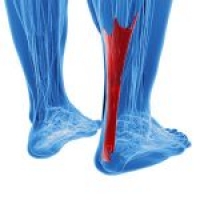If you find yourself engaging in vigorous activity, but only on the weekends, this is something you should be aware of. Achilles tendon injuries like Achilles tendonitis, or a ruptured Achilles tendon, can happen very quickly. For us non-professional athletes that don’t have time in our busy schedules to reach pinnacles of muscular strength, we are more susceptible to these acute injuries. The Achilles tendon connects the heel bone to the calf muscles and is essential to being able to walk. If the tendon ruptures, surgery will be necessary in order to repair this very painful injury. Achilles tendonitis is when the tendon becomes inflamed, typically due to overuse or not stretching beforehand. Both of these conditions can be treated by a podiatrist and if you experiencing intense heel pain you should consult with one immediately. In order to avoid these injuries, strengthening the tendon by gradually stressing them over time may be helpful. And always remember to stretch!
Achilles tendon injuries need immediate attention to avoid future complications. If you have any concerns, contact Dr. Kenneth Donovan from Advanced Care Foot and Ankle. Our doctor can provide the care you need to keep your pain free and on your feet.
What is the Achilles Tendon?
The Achilles tendon is a tendon that connects the lower leg muscles and calf to the heel of the foot. It is the strongest tendon in the human body and is essential for making movement possible. Because this tendon is such an integral part of the body, any injuries to it can cause severe difficulties and should immediately be presented to a doctor.
What are the symptoms of an Achilles Tendon Injury?
There are various types of injuries that can affect the Achilles tendon. The two most common are Achilles tendinitis and ruptures of the tendon.
Achilles Tendinitis Symptoms
– Inflammation
– Dull to Severe Pain
– Increased blood flow to the tendon
– Thickening of the tendon
Rupture Symptoms
– Extreme pain and swelling in the foot
– Total immobility
Treatment and Prevention
Achilles tendon injuries are diagnosed by a thorough physical evaluation, which can include an MRI. Treatment involves rest, physical therapy, and in some cases, surgery. However, various preventative measures can be taken to avoid these injuries, such as:
– Thorough stretching of the tendon before and after exercise
– Strengthening exercises like calf raises, squats, leg curls, leg extensions, leg raises, lunges, and leg presses
If you have any questions, please feel free to contact one of our offices located in New Jersey. We offer the newest diagnostic tools and technologies to treat your foot and ankle needs.

